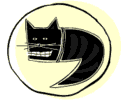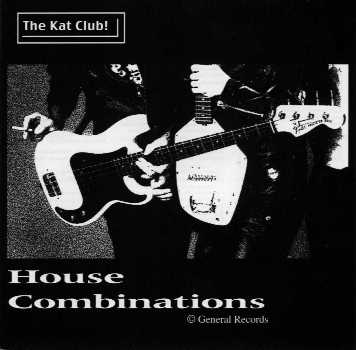 | LonsterRag Reviews. |
House
Combinations, the Kat
Club’s first release on General Records, takes me
back, brings me forward, knocks me to my knees, and just when I
think I've figured it out, it throws me over its shoulder and burps
me like a baby! It may well be the first neo-pop/R&B classic, on
the cusp of the millennium, or it might be impossible to
define...and that's fine too. The Kat Club consists of three people, two
are living and one is dead. And as you know—Kats do have nine
lives...the currently living members are Freddy
Moore: writing, vocals, guitar and stringed
instruments; Dennis J. Peters: production, bass
guitar, vocals, harmonica, piano, and drums. The dead guy is
Allen J. Galles: drums, vocals, and organ (donor?).
So if you do not believe in ghosts now, you soon will. From the
glowing pop guitar harmonies of "talk of the town" (Its
Not A Rumour), to the downtown street corner "do-wop" a
Capella + harmonica of Al’s End (more
please), you are transported through a virtual history lesson in
Americana.
On
several cuts, composer Moore pays tribute to one of his song writing
idols, Willie Dixon, by taking the blues yet another step away from
its 12-bar, walking bass formula. On (Don't That)
Make Me A Man the lyrics serve as a libretto for a
short three-act play. The 'man' in verse one claims he's the
'biggest' man because he's got money, the second 'man' claims
he's more of a man because he's got a beautiful young girlfriend,
while 'man' no. 3 claims he's got them all beat because he's got a
gun and he's willing to use it!
(Together) Like This sports a
jazzy-altered-blues groove reminiscent of Steely Dan, with lyrics
cataloging some of Moore's sandtraps-of-life, quite enjoyable!
Producer Dennis Peters does triple duty on another altered-blues,
Danitra, singing all lead and harmony vocals
while simultaneously playing bass guitar and blues
harp.
Dennis
Peters' lead bass guitar is prominently featured in
California, Here I Come, a sprawling epic,
about a blue-collar Midwesterner's mythical journey to the Promised
Land. He leaves his job and family and runs away in an attempt
to bag a rich old lady in LA. The music…try to imagine one of
Levon Helms' mandolin-flavored Band songs crossed with the
Who. You Want It All springs forth
from a fountain of verbiage, a Dylanesque stream-of-consciousness
about an impending break-up that happily sounds like David Bowie or
Elton John covering a Dylan song. On
Advice, one of the catchiest cuts, Moore
ends up singing like Ric Ocasik doing Dylan, while being backed by
Fleetwood Mac.
The 'power-pop' song, It's Not A
Rumour dates back to the Nu Kats' Plastic Facts
disc released by Rhino in 1980, but here the Kat
Club present a more mature, direct, raw rendition, which
made me think "hey, these guys had the Seattle Sound down a decade
before it became
the Next Big Thing!” A
classic pub-rocker, ala Nick Lowe and Dave Edmunds,
Midnight Motel is about the adulterous
entertainment the band discovered was quite popular while touring
the small towns of North America. The oddest, and therefore
most intriguing cut is a chord-less, jazzy groove called
Africentricity, the very few lyrics are
about man's prehistoric origins in Africa. Producer, Peters, keeps
the listener interested by deploying a spinning array of
cinema-sonic images.
On
many of the album's songs, lyricist Moore attempts proselytizing
from his bully pulpit. A Germanic church organ fugue serves as
the set up for God Is (My Tool) which then
launches into a raunchy Van Morrison-ish groove. Moore and
Peters sing about friends, family and historical figures who have
used God to get other people to do things their way. In
New Cage the band members sing about the
similarities between the old organized religions and new age belief
systems. Little Darlin's lyrics are as
direct as its sparse instrumentation: A lonely baby-boomer wants to
have a baby with or without a husband, and the lyrics simply ask,
"is she doing this for the wrong reasons?" Another bare boned
arrangement of drums, bass, guitar and vocals is used to present
I'm Still Hangin'. The lyrics detail a
narrow escape from heroin addiction.
There
are several tracks on House Combinations either sung by A.J. Galles
or written about A.J. Galles. The most romantic ballad on the
album, The Winter's Tale, details the true
story of Al Galles' courtship with his first wife, who was a
carny, traveling the continent from April to November and then
spending her winters in icy Minnesota with Galles. Moore sings the
narrative. (The Life Of) Donna Reed
has mid-century sounding music to go along with its title. The
lyrics proclaim a warning to all brides-to-be: your romantic fiancé
will soon become just an old husband. Galles' lead vocal is a
sizzler, and Moore's lead guitar is pretty slippery! Galles'
sings lead vocal on Hit Me!. Moore states
that the lyrics were written with Galles in mind. Hit
Me! portrays the descent into alcoholism that
eventually destroyed Galles' liver which eventually killed
him. Galles also sings lead on a short snippet from an older
version of Me A Man, which is presented a Capella, as the final cut
on the CD, a fond farewell to A.J. Galles.
The CD is full of sleepers, diamonds that begin to glow at
different times. The album seems to change shape as you continue to
play it. The music, of course, is mature, made by men who know who
they are and what they want to do. Its appeal to the ‘electronica’,
sample-based dance audience seems, on the evidence, to be limited.
What the Kat Club are attempting to do here is
create a music all their own, music that does not jump on the latest
band-wagon, music that is at once new and familiar, without being
nostalgic.
|




